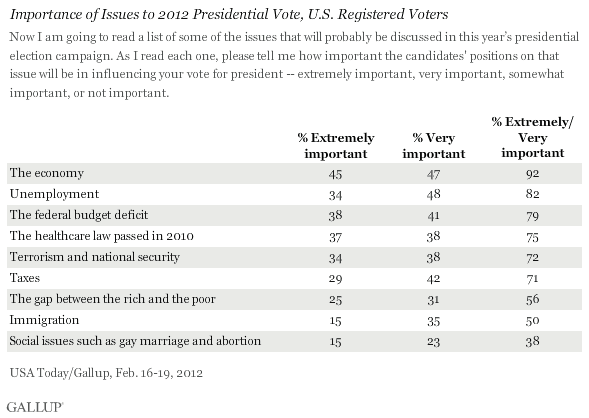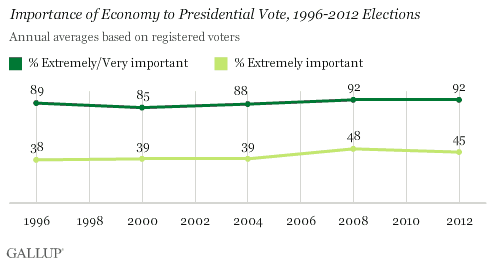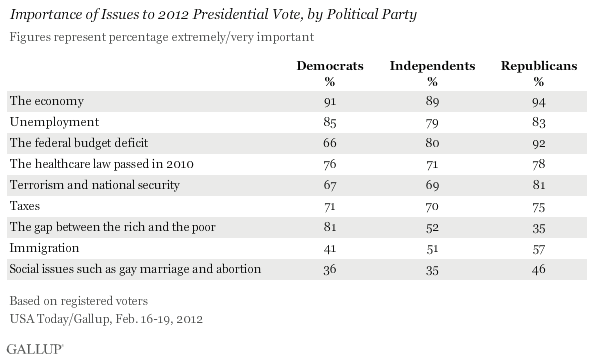PRINCETON, NJ -- More than 9 in 10 U.S. registered voters say the economy is extremely (45%) or very important (47%) to their vote in this year's presidential election. Unemployment, the federal budget deficit, and the 2010 healthcare law also rank near the top of the list of nine issues tested in a Feb. 16-19 USA Today/Gallup poll. Voters rate social issues such as abortion and gay marriage as the least important.

The high ranking of economic issues in the list is no surprise in a down economy. The rank order also mirrors the priority given to the economy, unemployment, and the deficit when Americans are asked to name the most important problem facing the country.
In fact, however, Americans have always rated the economy as a very important election issue. Even when the economy was relatively strong, as in the 1996, 2000, and 2004 elections, close to 9 in 10 said the economy was an extremely or very important issue to their vote, though fewer said it was extremely important in those years.

In years when the economy is strong, although it remains an important issue, Americans have rated other issues just as important or more so. For example, in 1996 and 2000, education ranked as high as the economy, and in 2004, terrorism and the Iraq war did. In down economic years such as 2008 and 2012, the economy has been the clear leader.
Economy Highly Important to All Party Supporters
All party groups rank the economy as their top issue this year, with roughly 9 in 10 Democrats, independents, and Republicans rating it as extremely or very important to their vote. Republicans, however, accord nearly the same importance to the federal budget deficit.
Party groups attach similar and relatively high importance to unemployment and the 2010 healthcare law. Social issues rank at or near the bottom for all groups, though these issues are somewhat more important to Republicans than Democrats and independents.

The greatest difference between Democrats and Republicans comes with respect to the gap between rich and poor -- 81% of Democrats rate it extremely or very important to their vote, compared with 35% of Republicans. Republicans (92%) and Democrats (66%) also show wide disparities in the importance of the federal budget deficit, and smaller but still notable differences on immigration and terrorism.
Implications
The economy is usually an important issue in helping voters decide whom to support in U.S. presidential elections. That seems to especially be true in years when an incumbent is seeking re-election; presidents have been easily re-elected in times of relative prosperity, such as in 1984 and 1996, and presidents have been defeated for a second term in down economies, such as in 1980 and 1992.
Thus, a key for President Obama is how well or poorly Americans rate the national economy, and his job of handling it. Currently, Americans are on balance more negative than positive about the national economy, although their perceptions have improved in recent months. And Americans remain more likely to disapprove than approve of Obama's handling of the economy, though these ratings have also shown some improvement.
Additionally, if Americans remain concerned about the economy, in order to win the election, Obama's eventual Republican opponent will have to convince voters that he is better able to handle it than the president is.
Track every angle of the presidential race on Gallup.com's Election 2012 page.
Sign up to get Election 2012 news stories from Gallup as soon as they are published.
Survey Methods
Results for this USA Today/Gallup poll are based on telephone interviews conducted Feb. 16-19, 2012, with a random sample of 898 registered voters, aged 18 and older, living in all 50 U.S. states and the District of Columbia.
For results based on the total sample of registered voters, one can say with 95% confidence that the maximum margin of sampling error is ±4 percentage points.
Interviews are conducted with respondents on landline telephones and cellular phones, with interviews conducted in Spanish for respondents who are primarily Spanish-speaking. Each sample includes a minimum quota of 400 cell phone respondents and 600 landline respondents per 1,000 national adults, with additional minimum quotas among landline respondents by region. Landline telephone numbers are chosen at random among listed telephone numbers. Cell phone numbers are selected using random-digit-dial methods. Landline respondents are chosen at random within each household on the basis of which member had the most recent birthday.
Samples are weighted by gender, age, race, Hispanic ethnicity, education, region, adults in the household, and phone status (cell phone only/landline only/both, cell phone mostly, and having an unlisted landline number). Demographic weighting targets are based on the March 2011 Current Population Survey figures for the aged 18 and older non-institutionalized population living in U.S. telephone households. All reported margins of sampling error include the computed design effects for weighting and sample design.
View methodology, full question results, and trend data.
In addition to sampling error, question wording and practical difficulties in conducting surveys can introduce error or bias into the findings of public opinion polls.
For more details on Gallup's polling methodology, visit www.gallup.com.
